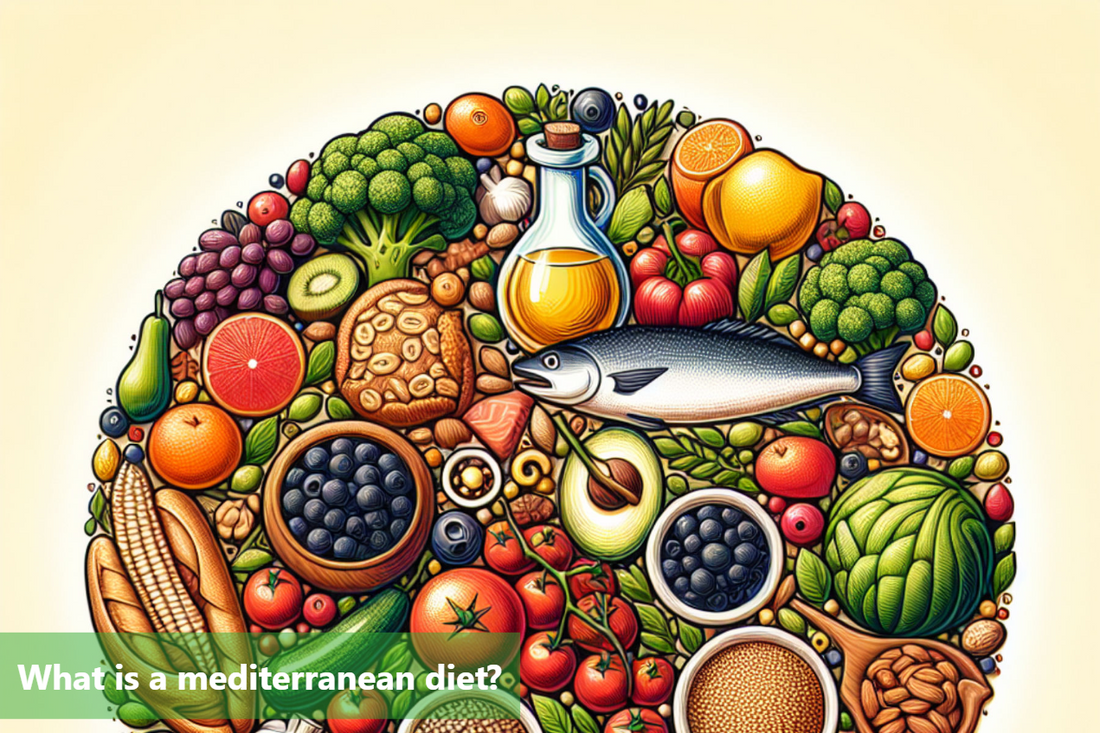The Mediterranean Diet is a lifestyle focused on nutrient-rich foods inspired by traditional Mediterranean dietary patterns. It includes fresh fruits, vegetables, whole grains, nuts, seeds, olive oil, fish, poultry, and dairy products. Emphasizing plant-based foods rich in vitamins and antioxidants, this diet supports overall health. Olive oil provides healthy monounsaturated fats. Moderate consumption of dairy, lean proteins, and limited red meat, seasoned with herbs and spices, promotes heart health, weight management, and blood sugar control. Adopting this diet encourages mindful eating and wellness.
Key Components of the Mediterranean Diet
-
Fresh Fruits and Vegetables
An abundance of colorful and nutrient-dense foods
Essential vitamins, minerals, and antioxidants
-
Whole Grains
Staples like barley, farro, and quinoa
Good source of energy and fiber
-
Healthy Fats
Olive oil as a key ingredient
Heart-healthy monounsaturated fats
-
Seafood
Rich in omega-3 fatty acids
Options like salmon, sardines, and tuna
-
Nuts, Seeds, Legumes
Provide additional nutrients and variety
Add richness and texture to meals
-
Dairy Products in Moderation
Yogurt and cheese
Dietary diversity and flavor enhancement
Benefits of the Mediterranean Diet
Holistic Health: The diet is primarily plant-based, rich in vitamins, minerals, and fiber, promoting overall well-being.
Heart Health: Incorporating olive oil as the primary source of healthy fats can lower cholesterol levels and reduce the risk of cardiovascular diseases.
Nutrient-Rich Proteins: Moderate amounts of dairy products, poultry, and fish in the diet provide high-quality proteins and essential nutrients.
Weight Management: Limiting red meat, processed foods, and sweets reduces the risk of obesity and related conditions.
Cancer Prevention: The abundance of antioxidants in fruits and vegetables helps fight inflammation and protect against chronic diseases like cancer.
Cognitive Function: Consuming fatty fish like salmon and sardines is associated with improved cognitive function and reduced risk of cognitive decline in older adults.
Sustainable Lifestyle: Emphasis on whole foods and minimal processed ingredients promotes sustainable weight management and a healthy lifestyle overall.
How to Incorporate the Mediterranean Diet into Your Lifestyle
Increase Vegetable and Fruit Intake: Aim to include a variety of colorful produce in your meals to benefit from essential vitamins, minerals, and antioxidants.
Choose Whole Grains Over Refined Grains: Opt for whole grains like quinoa, brown rice, and whole wheat bread to boost your nutrient intake.
Incorporate Healthy Fats: Use olive oil, nuts, and seeds in your cooking for heart-healthy benefits and explore various ways to include them in your meals.
Include Seafood, Especially Fatty Fish: Enhance your omega-3 fatty acid intake by adding fatty fish like salmon and sardines to your diet for added health benefits.
Appreciate Mealtimes Socially: Enjoy meals with loved ones and take the time to savor the flavors and connections that food can bring to your daily routine.
Key Points of the Mediterranean Diet
Abundance of Plant-Based Foods: The Mediterranean Diet mainly consists of fruits, vegetables, whole grains, legumes, nuts, and seeds. These foods are rich in vitamins, minerals, fiber, and antioxidants.
Healthy Fats: Olive oil is a staple in the Mediterranean Diet and serves as the primary source of healthy monounsaturated fats. Fish, particularly fatty fish like salmon and sardines, are also essential for their omega-3 fatty acids.
Moderate Dairy and Poultry: Dairy products, especially yogurt and cheese, are consumed in moderation in this diet. Poultry such as chicken and eggs are included but in smaller quantities compared to plant-based foods and fish.
Limited Red Meat and Sweets: Red meat and sweets are enjoyed sparingly in the Mediterranean Diet. Reducing the consumption of these foods helps lower saturated fat and added sugars intake.
Emphasis on Flavorful Herbs and Spices: Herbs and spices like garlic, oregano, basil, and thyme are used abundantly to add flavor without the need for excess salt or unhealthy fats.
Incorporating the Mediterranean Diet into your lifestyle can lead to improved heart health, weight management, and overall well-being.
FAQs
What is a Mediterranean diet?
The Mediterranean diet is a way of eating based on the traditional foods and cooking styles of countries bordering the Mediterranean Sea. It emphasizes plant-based foods such as fruits, vegetables, whole grains, nuts, and legumes, along with moderate amounts of fish, poultry, and dairy products.
What are the health benefits of a Mediterranean diet?
A Mediterranean diet has been associated with numerous health benefits, including reduced risk of heart disease, stroke, certain cancers, diabetes, and Alzheimer's disease. It is also known for promoting longevity and overall well-being.
Can I include red meat in a Mediterranean diet?
While a Mediterranean diet doesn't exclude red meat entirely, it is typically consumed in small amounts and less frequently than other protein sources like fish and poultry. The focus is more on plant-based foods and healthy fats like olive oil.
Are there any specific guidelines for following a Mediterranean diet?
The Mediterranean diet does not have strict rules or calorie restrictions. Instead, it encourages choosing whole, minimally processed foods, incorporating plenty of colorful fruits and vegetables, using olive oil as the primary fat source, and enjoying meals with family and friends.
Is a Mediterranean diet suitable for vegetarians or vegans?
Yes, a Mediterranean diet can be easily adapted for vegetarians and vegans by emphasizing plant-based protein sources like beans, lentils, tofu, and nuts. It's all about incorporating a variety of nutrient-rich foods and following the key principles of the Mediterranean way of eating.
This Blog post is an initiative by DiabeSmart, to provide accurate and Nutritionist / Doctor approved information related to Diabetes. DiabeSmart is India's first Food brand designed specifically for Diabetics, that has been clinically tested on Diabetics and Pre-Diabetics to deliver 55% - 70% lower Sugar spikes. DiabeSmart is part of Lo! Foods - India's leading brand for Everyday Functional Health foods.







